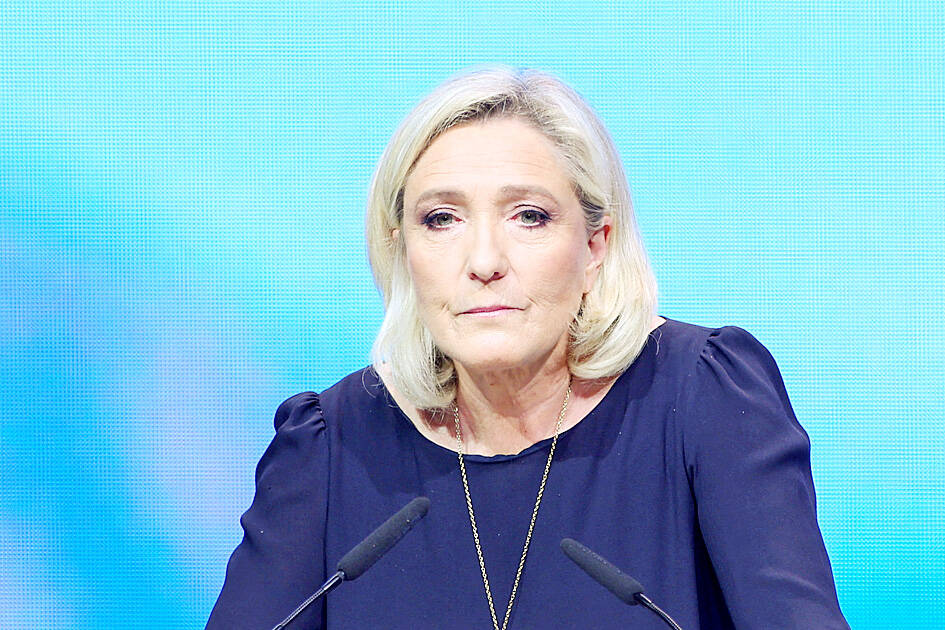Europe’s far-right figureheads, French National Rally’s (RN) Marine Le Pen and Italian Prime Minister Giorgia Meloni are hinting they could join forces following this summer’s EU elections, after Le Pen’s party announced a break with its radical German ally, Alternative for Germany (AfD).
The overtures presage a possible reconfiguration of nationalist parties’ alliances after voters decide the next European Parliament in elections from June 6 to June 9.
Surveys suggest the parliament’s far-right groups — fractured — would win about 37 percent of seats in the next legislative term, up from 30 percent.

Photo: Reuters
At a far-right rally in Madrid on Sunday, Le Pen declared: “We are all together in the final stretch to make June 9 a day of liberation and hope.”
A day later Meloni in a television interview said that she wanted to replicate the success of her post-fascist party at home and “do the same thing in Europe: Ally parties that are compatible with each other in terms of vision, even with completely different nuances.”
The door to that scenario opened wider on Tuesday when Le Pen’s RN said it was splitting with the AfD.

Photo: AFP
The announcement came after the AfD’s lead EU candidate Maximilian Krah — buffeted by controversies — told an Italian newspaper that not every member of the Nazi’s feared SS was “automatically a criminal.”
“The AfD crossed what I consider to be red lines,” RN president Jordan Bardella told French channel LCI.
He said far-right alliances in the European Parliament would “go back to zero” after the elections.
The RN and AfD are part of the extreme-right Identity and Democracy (ID) EU parliament group.
Meloni’s Brothers of Italy party, sits with the far-right European Conservatives and Reformists (ECR).
A third hard-right force sits in the EU parliament in the form of Fidesz, the unaffiliated party of Kremlin-friendly Hungarian Prime Minister Viktor Orban.
Analysts say key issues divide the parliament’s far-right factions. Most notably, the ID is skeptical of continued EU support for Ukraine’s war against Russia’s invading army, while the ECR backs Kyiv in its fight.
“These deep-seated differences seem difficult to reconcile,” Robert Schuman Foundation managing director Pascale Joannin said in an analysis.
However, German Institute for International and Security Affairs’ Nicolai von Ondarza wrote on X that “a more fundamental change has now ... become possible” because of the RN-AfD split.
Le Pen could now “argue for a merger with Meloni, Orban, [Dutch Geert] Wilders & Co towards a united far-right sans the most radical part,” Von Ondarza said.
However, Von Ondarza added that most likely, “the differences... are too high” for that to happen.
Centre for Britain and Europe codirector Daniele Albertazzi wrote on X that while it might be “logical” for Le Pen’s RN to abandon the ID and join the ECR, “she may well resent playing second fiddle to Meloni.”
“Too many queen bees and the bee hive descends into anarchy,” he said.
While Le Pen has welcomed Meloni “opening the way” to a possible rapprochement, she also said last year that the Italian leader “is not my twin sister.”
Le Pen is more closely allied with Italian Deputy Prime Minister Matteo Salvini, from the far-right League party — a fellow ID member.
Salvini’s team on Wednesday posted a photo of him meeting online with Le Pen to “take stock of the situation ahead of the European elections, also in light of the reflections shared yesterday on the future composition of the ID group.”
Von Ondarza said that while the “power potential would be there” for a Le Pen-Meloni configuration, the far-right forecast was “messy.”
European Policy Centre policy analyst Eric Maurice said he believed that “the break isn’t total” between the RN and the AfD, and that the announcement of a split could prompt the German party to “tone down its radical image.”
A hypothetical ID-ECR merger could create the second-biggest grouping in the parliament, behind the conservative European People’s Party (EPP) of European Commission President Ursula von der Leyen — who is tipped for a second term.
However, even divided, a bolstered far right could pull the EPP in its direction, European Council on Foreign Relations senior policy fellow Pawel Zerka said.
“We cannot fully trust the EPP” not to ally with the far right, Zerka told the European Center for Populism Studies.

POLITICAL PRISONERS VS DEPORTEES: Venezuela’s prosecutor’s office slammed the call by El Salvador’s leader, accusing him of crimes against humanity Salvadoran President Nayib Bukele on Sunday proposed carrying out a prisoner swap with Venezuela, suggesting he would exchange Venezuelan deportees from the US his government has kept imprisoned for what he called “political prisoners” in Venezuela. In a post on X, directed at Venezuelan President Nicolas Maduro, Bukele listed off a number of family members of high-level opposition figures in Venezuela, journalists and activists detained during the South American government’s electoral crackdown last year. “The only reason they are imprisoned is for having opposed you and your electoral fraud,” he wrote to Maduro. “However, I want to propose a humanitarian agreement that

ECONOMIC WORRIES: The ruling PAP faces voters amid concerns that the city-state faces the possibility of a recession and job losses amid Washington’s tariffs Singapore yesterday finalized contestants for its general election on Saturday next week, with the ruling People’s Action Party (PAP) fielding 32 new candidates in the biggest refresh of the party that has ruled the city-state since independence in 1965. The move follows a pledge by Singaporean Prime Minister Lawrence Wong (黃循財), who took office last year and assumed the PAP leadership, to “bring in new blood, new ideas and new energy” to steer the country of 6 million people. His latest shake-up beats that of predecessors Lee Hsien Loong (李顯龍) and Goh Chok Tong (吳作棟), who replaced 24 and 11 politicians respectively

Young women standing idly around a park in Tokyo’s west suggest that a giant statue of Godzilla is not the only attraction for a record number of foreign tourists. Their faces lit by the cold glow of their phones, the women lining Okubo Park are evidence that sex tourism has developed as a dark flipside to the bustling Kabukicho nightlife district. Increasing numbers of foreign men are flocking to the area after seeing videos on social media. One of the women said that the area near Kabukicho, where Godzilla rumbles and belches smoke atop a cinema, has become a “real

‘WATER WARFARE’: A Pakistani official called India’s suspension of a 65-year-old treaty on the sharing of waters from the Indus River ‘a cowardly, illegal move’ Pakistan yesterday canceled visas for Indian nationals, closed its airspace for all Indian-owned or operated airlines, and suspended all trade with India, including to and from any third country. The retaliatory measures follow India’s decision to suspend visas for Pakistani nationals in the aftermath of a deadly attack by shooters in Kashmir that killed 26 people, mostly tourists. The rare attack on civilians shocked and outraged India and prompted calls for action against their country’s archenemy, Pakistan. New Delhi did not publicly produce evidence connecting the attack to its neighbor, but said it had “cross-border” links to Pakistan. Pakistan denied any connection to